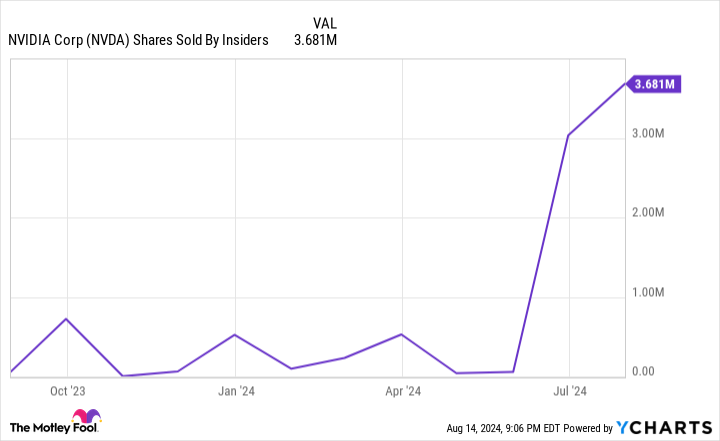Billions Dump Artificial Intelligence (AI) Stock Nvidia for Third Straight Quarter — Here’s Why | The Motley Fool
More than half a billion well-known money managers were Wall Street’s leading artificial intelligence (AI) traders for the third consecutive quarter.
The most important quarterly data release happened earlier this week — and I’m not talking about the highly anticipated July cash flow report.
Within 45 calendar days after the end of the quarter, institutional investors with at least $100 million in assets under management must file a Form 13F with the Securities and Exchange Commission. The 13F provides insight into what Wall Street’s smartest, most successful, and wealthiest investors are buying and selling.
Despite the limitations of 13Fs – for example, they are about 45 days old, which means the data you see may be out of date for active fund managers – they provide important information on how what are stocks, industries, sectors and trends. piqued the interest of Wall Street’s brightest asset managers.

Image source: Getty Images.
Although there has been a lot of buying and selling activity for companies involved in the current investment trend, artificial intelligence (AI), the latest headline on 13Fs is that Wall Street’s billionaire investors are still they continue to reduce their participation in the beloved AI. Nvidia (NVDA Image 0.04%).
Nvidia has become the backbone of the artificial intelligence movement
Since the page was turned to 2023, Nvidia shares have fallen more than 709%, as of the closing bell on Aug. 14, which translates into a market capitalization of more than $2.5 trillion. Several multi-billionaire investors and their funds have benefited greatly from this upward trend.
A hit that has made the company’s history leading the market is the company’s data-center equipment. In particular, Nvidia’s H100 graphics processing unit (GPU) has become the brain that powers the second decisions needed in business data centers that run AI solutions that generate and train large language models. By 2023, Nvidia chips were close to a monopoly (a 98% share) of GPUs shipped to data centers, according to TechInsights.
The beauty of having a product that is in high demand is the unique pricing power that often comes with it. With the demand for more supply than the H100, Nvidia was able to increase the retail price of its AI-GPU from between $30,000 and $40,000. The result was a significant increase in the company’s adjusted gross profit.
But not all fund managers believe Wall Street’s AI leader has enough gas left in the proverbial tank to deliver to investors.
Billionaire investment managers sold Nvidia shares for the third consecutive quarter
According to the 13Fs recently filed in Aug. 14, the top seven billionaire asset managers were sellers of Nvidia stock during the quarter ended in June (total shares traded in parentheses):
- Ken Griffin of Citadel Advisors (9,282,018 shares)
- David Tepper of Appaloosa (3,730,000 shares)
- Stanley Druckenmiller of Duquesne Family Office (1,545,370 shares)
- Cliff Asness of AQR Capital Management (1,360,215 shares)
- Israel Englander of Millennium Management (676,242 shares)
- Steven Cohen of Point72 Asset Management (409,042 shares)
- Philippe Laffont of Coatue Management (96,963 shares)
During the March quarter, eight billionaire investors — nine, if you include Jim Simons of Renaissance Technologies, who died in May — sent Nvidia shares to the chopping block, while eight billionaires also were sellers in the quarter ended December. .
While profit-taking after a huge windfall is a reasonable explanation for the billionaire investor’s exodus, there are about a dozen other factors that could shed light on more about why fund managers continue to exit.

Image source: Getty Images.
Five reasons billionaires can’t stop selling Nvidia shares
History is perhaps the most obvious reason why billionaires are on the move. Every major technology and trend of the past 30 years has gone its own way.
In other words, investors’ expectations about adoption and use have exceeded reality for every amazing innovation of the past three decades. With many businesses lacking a clear plan on how to generate the best returns on their AI investments, it seems that AI is the next in a long line of the next big bubbles. If the AI bubble bursts, no stock would be hit harder than Nvidia.
The prospect of a meaningful increase in competition is another reason why billionaires may show Nvidia shares at the door. Due to the large addressable AI market, many external competitors are entering the picture with their own AI-GPUs.
In addition, four of Nvidia’s largest customers by network sales are developing AI chips for their data centers. These additional chips will reduce the “load” in high-end data centers for Nvidia devices.
Thirdly, billionaires wisely ignore the ceiling that the authorities have set. In 2022, and again in 2023, US authorities imposed export restrictions on China for Nvidia’s most powerful AI chips. After the first round of restrictions in 2022, Nvidia introduced the toned-down H800 and A800 chips for the world economy 2. Unfortunately, these GPUs have been added to the list of restrictions of foreign origin last year. These restrictions could cost Nvidia billions of dollars in quarterly sales.

NVDA shares traded by insider data is YCharts.
A fourth influence on the ongoing sales of billionaires may be related to the lack of buy-in we have seen from company insiders. There has been no open stock purchase of Nvidia from an executive or board member since December 2020. Meanwhile, CEO Jensen Huang has been selling his company by hand from mid-June.
While not all domestic sales are bad news — some sales can be done for tax purposes — the absolute lack of buying suggests that none of the Nvidia executives believe the shares are a good value.
Finally, Nvidia’s value is critical. While the price-to-earnings (P/E) ratio suggests that the shares may be cheap, its 12-month (TTM) price-to- sales (P/S) reached levels in June over TTM P. /S peaks observed from the likes of Cisco Systems and Amazon before the bursting of the dot-com bubble.
Despite the excitement surrounding artificial intelligence, the actions of some Wall Street investment geniuses seem to suggest that trouble lies ahead.
John Mackey, former CEO of Whole Foods Market, an Amazon subsidiary, is a member of The Motley Fool’s board of directors. Sean Williams has positions at Amazon. The Motley Fool ranks and recommends Amazon, Cisco Systems, and Nvidia. The Motley Fool has a publicity strategy.
#Billions #Dump #Artificial #Intelligence #Stock #Nvidia #Straight #Quarter #Heres #Motley #Fool
